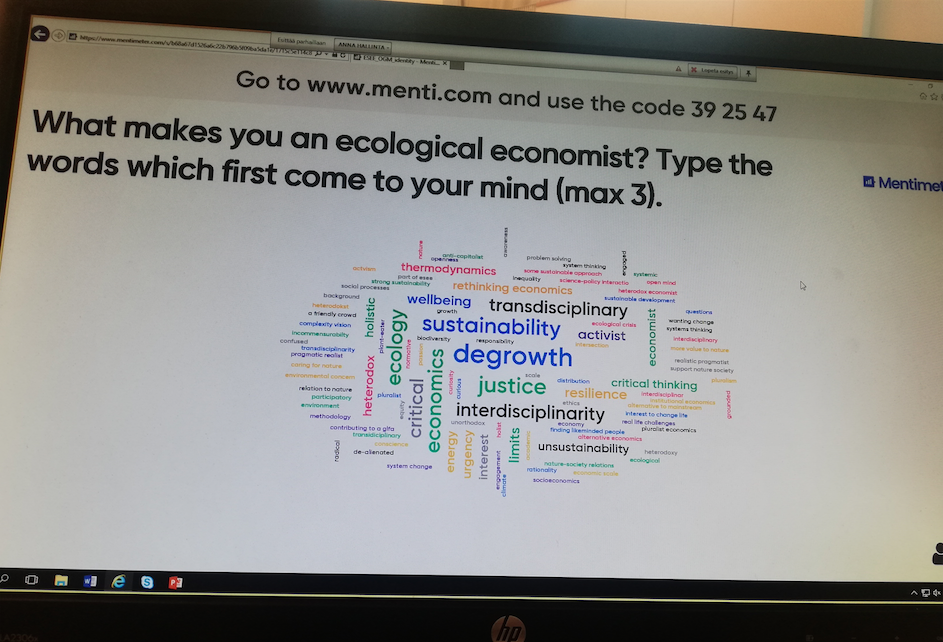A new star is born in the sky of the social movements: the degrowth-movement. The traditional left, however, observes this novelty somewhat critically – degrowth being a path that seems possible without the traditional left. Marxist, feminist and anti-racist analyses were largely missed at the latest Degrowth-Conference and where they were present, participants eyed them rather sceptically. On top of this and besides the insufficient action-orientation, also the social structure of the participants seemed a bit biased. It seems to have been mostly students and academics and as such parts of the (future) privileged groups. Lower classes or at least representatives of their interests - the targeted allies in most leftist strategies to capture the center – were missing. In addition, the critique of consumption and the focus on practical steps for “lifestyles of less” appear ambivalent at least, as they are suspected to legitimize redistribution from bottom to top.
When looking at the various titles of the conference events, there is indeed not much marxist, feminist or anti-racist vocabulary to be found - and even less pointing to regulation-theory and Gramscian approaches. The fatal impacts of the growth-economy here and in the Global South are rather described and bemoaned from a moral perspective and that of cultural critique.
And yet the movement is not at all conforming to a capital-dominated economy. I even dare to make the case that a new string of critique of capitalism might “objectively” emerge from here. A critique that is far more dangerous for this growth-dependent system than previous paradigms of critique which took the production of poverty, exclusions or economic disfunctionalities as their starting points.
Already the title of the Leipzig “International Conference on Degrowth for Ecological Sustainability and Social Equity” points to the claim of integrally combining ecology with social justice. But did the conference actually live up to it?
At first sight, the abundance of events and topics did not allow a quick overview of the topical weighting. Roughly one half of this mega-meeting consisted of “theory”, and the other half of “practice”: of scientific and political reflections on necessities, concepts, transformation paths and obstacles for a postgrowth society on the one hand, and practical workshops for exchange and initiation of bottom-up interventions for a postgrowth culture on the other.
The following events from the “theoretical part” can be directly attached to the topic of social justice:However, the topic of social justice was not only addressed in the narrow sense of distribution of income, consumption and work. Another bunch of events was rather devoted to the question of the necessary/suitable societal structure of a postgrowth society, as implied for example in the following topical complexes:
Furthermore, it wasn’t about a distant utopia. The question of the political path was equally addressed in a broad variety:
The minor role of traditionally left models of critique (feminism, marxism, anti-racism) was also due to the fact that these mainly concentrate on the analysis of the existing instead of daring to develop concrete alternatives to it. Models for alternatives can easily be exposed to all sorts of criticism: Cultural approaches might leave the principle of profit untouched, politics of sufficiency might legitimize extra profits, models of autonomy might delegate care-work back to women, eco-taxation might be perceived as commodification of nature, the discussion of alternative monetary systems might distract from the exploitation through the “productive” capital, etc. All these approaches could be dangerous – within the wrong framing of Green Capitalism.
However, it is common sense within the Degrowth-movement that a Green Economy or Green Capitalism is not sufficient and possibly counterproductive for a better relation of society with nature. Of course, the growth critique derived from this approach is not per se an emancipatory and left one, and its scope ranges from the conservative rejection of modern liberties to the radical questioning of any form of authority and representation.
However, as far as the Leipzig Degrowth Conference and also its broader support structure is concerned, emancipatory claims and approaches towards overcoming the forces of growth are prevailing by far. A few examples of the debate's reference points may shed further light on this:
The discussed alternative cultures of collective living/working/producing/consuming are shaped by the claim of direct participation and direct collectivization. Thereby, the concept of a “living environment” which is structured by communication, is being strengthened against the influence of the “systems” with their hidden systemic steering mechanisms money and/or authority. At the same time, the ideas of localism and ruralism are critically discussed.
On the one hand, the claim for degrowth – directed towards the industrialized societies of the north and their followers – is in direct opposition to their “imperial mode of living”. On the other hand, the harmfulness of wealth (as an enabler of waste) is explicitly addressed while the necessity of equal access to resources and basic goods is emphasized. The debate on basic income (in material or monetary form) is an example for this.
One aspect of the discussion are possible models and effects of shortened working hours and “good work”. Another one focuses on various autonomous types of work beyond wage labour, for example do-it-yourself and community work, leisure, etc. So the point is nothing less than the question of the possibility and substance of liberated work as well as its interaction with production and consumption.
These few examples show: Various mechanisms and structures of authority and inequality are analyzed as growth-drivers. With this, the growth-critical movement focuses on a central point.
In the saturated countries of the North, further economic growth will only be possible if society as a whole becomes more unequal. The wider the gap between high and low income, the more people will be prepared to take up socially and ecologically problematic activities – in order to pay their rent as low-wagers or to maintain the distance to the lower class as members of the middle class. In addition, further economic growth needs an authoritarian society. It guarantees the growth of status consumption: Whoever feels suppressed at work, in the neighbourhood or in society will strive for status symbols in order to present a different picture in the public or at least for themself. This is not only “left” social-psychological theory, but also underpinned by empirical studies such as “The Spirit Level” by Richard Wilkinson and Kate Picket.
In conclusion, this unveils the social-structural conditions of a postgrowth society: such a society will have to be more equal and free than the growth-dependent one, thus pursuing two central goals of modernity – which might only then unfold their full potential. This requires bottom-up initiatives and model projects, but can only be generalized through postgrowth policies that provide free spaces for all members of society and secure more equality throughout society– as a basis for spreading postgrowth cultures beyond small vanguards.
It is the duty of the left to develop attractive policy offers, paradigms, up to date claims and pointed analyses for this. A new society only grows in the lap of the old one, and also a new economy does not emerge from nowhere. It will have to link up to existing tendencies. In spite of this, these would still be “non-reformist reforms” (Andre Gorz). This is because policies that achieve more equality in distribution and liberty for everyone will have to push back structures of inequality, of racism, sexism and power of capital. These policies will lead to a new societal hegemony, a new of regulating the economy. Can this still be called capitalism?
------------------------ This article is based on a discussion paper presented at the workshop “Growth Critique and the Democratization of Societal Nature Relations” organized by the Rosa Luxemburg Foundation.
Translation: Christiane Kliemann

The time has come for ESEE to take a firmer stand and address the impossibility of tackling the monumental ecological crisis we are facing with partial solutions. In order to remain relevant ESEE needs to empower its members to speak the truth, confront power and focus their energies on finding meaningful, holistic and truly transformative solutions. The 13th International Conference of the ...

The topic of population growth is often omitted from any debate regarding environmental impact in all academic circles ranging from classical to heterodox. While it is undeniable that the global population is increasing and will continue to increase for some time, no serious address towards the seemingly obvious relationship between population growth and environmental degradation is directly di...

By Lasse Thiele Is degrowth only conceivable in the context of “oversaturated” industrial societies while the global “South” remains dependent on growth? In two installments, this article questions such assumptions. In this first part it introduces positions critical of development which refuse to adopt the Western model of prosperity; the second part will focus on the analysis of these positi...